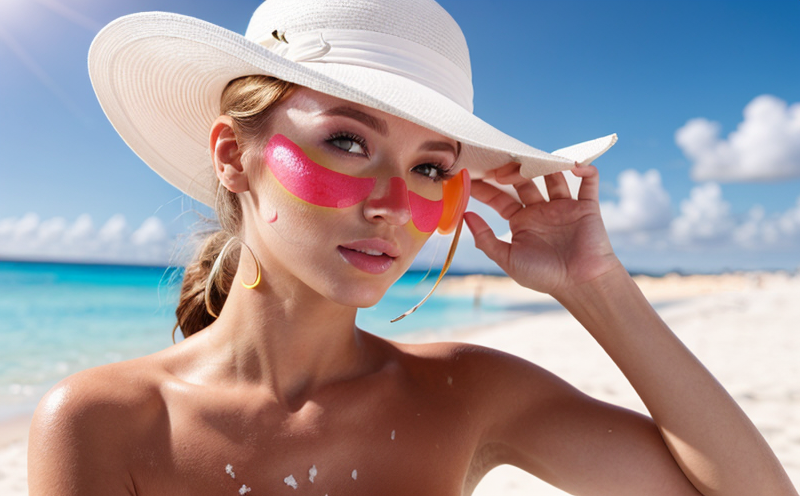Water Resistance Testing of Sunscreen Products
Water resistance testing is a critical component in the quality assurance and regulatory compliance process for sunscreen products. The purpose of this test is to evaluate how effectively sunscreens maintain their protective properties when exposed to water, such as during swimming or bathing activities. This service ensures that consumers receive the promised level of protection even after prolonged contact with water. Water resistance testing typically follows international standards like ISO 24759:2018 and ASTM F803-18a, which provide comprehensive guidance on test procedures. These standards define specific conditions under which the sunscreen must be tested to determine its resistance to water. The test involves applying a known amount of sunscreen onto a standardized specimen, allowing it to dry according to specified time intervals, then exposing it to simulated seawater or fresh water for a set duration. Afterward, the remaining protection factor (SPF) is measured both before and after the exposure period. This testing not only enhances consumer safety but also helps manufacturers meet stringent regulatory requirements across various countries. Compliance with these regulations ensures that products are safe and effective when used as directed by consumers. The results of water resistance tests play a vital role in marketing claims made about sun protection factors, ensuring accurate labeling and fair representation to the public. Given the importance of this service, it is essential for laboratories specializing in cosmetic testing to have experienced staff who understand both the technical aspects of the test method as well as its broader implications. Our team includes experts familiar with current guidelines from multiple jurisdictions, allowing us to provide robust and reliable testing services tailored specifically for our clients' needs.Benefits
- Enhanced Consumer Safety: Ensures that consumers receive the expected level of protection from their sunscreen products, even after exposure to water.
- Regulatory Compliance: Helps manufacturers meet international standards and local regulations regarding sun protection factor claims.
- Market Differentiation: Provides a competitive edge by demonstrating commitment to product quality through rigorous testing procedures.
- Improved Product Reputation: Builds trust with consumers who can rely on accurate labeling of their purchased products.
- Better Understanding of Real-World Performance: Simulates actual usage conditions to provide insights into how well the product performs under various environmental factors.
- Increased Consumer Confidence: Ensures that consumers have confidence in the effectiveness and safety of their sunscreen products, which can lead to increased sales and loyalty.
Environmental and Sustainability Contributions
Water resistance testing contributes positively to environmental sustainability by ensuring that sunscreens do not degrade or lose efficacy in aquatic environments. This helps prevent potential pollution caused by improperly formulated products breaking down into harmful chemicals over time. By adhering strictly to established standards, laboratories like ours play a crucial role in promoting responsible manufacturing practices within the cosmetic industry. The testing process itself also aligns with broader sustainability goals by fostering innovation and continuous improvement among manufacturers. Through thorough evaluation of product performance, these efforts encourage the development of more sustainable formulations that minimize waste while maintaining high levels of effectiveness.Use Cases and Application Examples
Water resistance testing is applicable across several scenarios within the cosmetic sector: - New Product Development: Early-stage evaluation ensures new sunscreen formulas meet required standards before full-scale production begins. This helps identify any potential issues early on, allowing for necessary adjustments to be made promptly. - Manufacturing Quality Control: Regular testing throughout the manufacturing process guarantees consistent quality across batches of sunscreen products. It also allows companies to detect any deviations from expected performance quickly. - Labeling Accuracy: Ensures that all claims regarding water resistance are accurate and supported by empirical data, helping maintain consumer trust in the brand. - Product Recall Prevention: Identifying any discrepancies early on helps prevent costly recalls later down the line. This proactive approach saves time, money, and resources for both manufacturers and retailers involved.Frequently Asked Questions
What is the difference between water resistance and sweat resistance?
Water resistance refers to a sunscreen's ability to maintain its protective properties when exposed to water, while sweat resistance focuses on how effectively it protects against perspiration. Both are important but require different testing methods.
Why is water resistance testing necessary?
Water resistance testing ensures that sunscreen remains effective under real-world conditions, providing consumers with the protection they expect and deserve.
Can any laboratory conduct this type of testing?
While many laboratories may claim to offer water resistance testing services, not all have the expertise or facilities required for accurate results. It's important to choose a reputable lab with experience in cosmetic testing.
How long does it take to complete this test?
The duration can vary depending on the specific requirements and complexity of the product being tested. Typically, however, it takes between two weeks to one month from start to finish.
Is this test required by law?
In many countries, yes; water resistance testing is part of the regulatory requirements for sunscreen products. Meeting these standards helps ensure compliance with local laws and regulations.
What kind of equipment is used during this test?
Specialized equipment includes a water tank or pool filled with simulated seawater or freshwater, along with timers, spectrophotometers for measuring SPF levels, and other instruments designed specifically for cosmetic testing.
How do I know if my product meets the required standards?
The results of water resistance tests are compared against specified criteria outlined in relevant international standards. If your product meets these criteria, it will be deemed compliant.
Are there any additional costs associated with this service?
Additional fees may apply based on factors such as sample size, turnaround time, and specialized equipment needed. It's advisable to consult directly with the lab performing the tests for more details.





